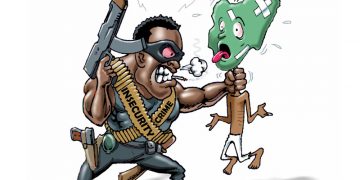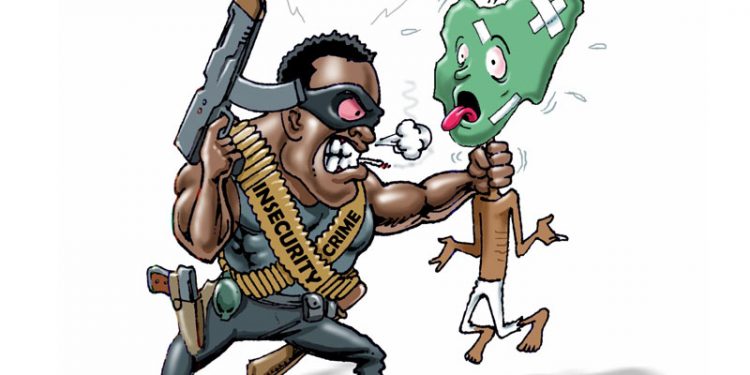By Emmanuel Obisue
If Nigeria were a door to a house, the perfect solution would have been to shut it, and reopen in 2023 for detoxification. Whether we like it or not, as it stands, the nation is on a journey to obliteration. Nigeria’s case can be likened to a young girl who rebuffed her mother’s advice to keep her private part wholly till marriage, in the end, it will only suffer the consequences of random sex. It can be likened more to throwing a stone into a river and expecting it to float.
While the President, Muhammadu Buhari is ‘resting’ in luxury with his supposed doctors in the United Kingdom, the nation is on the boil. His body language and even that of those around him, suggests that they do not really care. In the heat of the COVID-19 pandemic, world leaders made use of their home-made healthcare facilities. COVID was an emergency that caught the world off guard, but most of these countries were ready to tackle it. All they needed do was fall back on already provided healthcare. In Nigeria at the time, the most up-to-date healthcare systems were those of herbalists and native doctors. That is why many Nigerians doubted the efficacy of the virus, while some others believed that local herbs or ‘agbo’, could kill the virus.
With COVID exposing the gross shortfall in the nation’s health sector, one would have expected it to be an eye opener to spur the Buhari-led government to carry out aggressive improvement in the sector. But no, they waited for the perfect opportunity to smuggle the president to medical tourism, leaving striking doctors at the mercy of the streets. The National Association of Resident Doctors, NARD, were left to register their grudge to the president in absentia.
For a government that rode unto power pretending that it would slit corruption in the throat, the current state of the nation clearly defines deception. The current administration has negatively improved on the many challenges of the country, and have also done well to introduce new ones.
In the North East, there is unending insurgency. Only last week, an unnamed Soldier told Sahara Reporters of a certain Army Commander of 145 Battalion in Damasak, Borno State, Brigadier General Tilawan, who was frustrating efforts to win the war. According to the Soldier who spoke on condition of anonymity, the said commander was an agent of Boko Haram. He suspiciously stopped military personnel from engaging the terrorists when they attacked the town that houses Internally Displaced Persons, IDPs.
“A few days ago, a company was dislodged by Boko Haram militants and when our people tried to go for reinforcement, he said we should not go. That day we lost 10 soldiers and today when the jet came, they told us that they could sight the Boko Haram guys but could not bomb because civilians were there, and that we should go with our little weapons and recapture the town.
“Tilawan still gave order that we should not go to that town. He has forgotten that we are here because of these people. The world should come and do something about this man before the issue gets out of hand. The governor should know that his people are no longer safe because of the Brigadier General S. S. Tilawan, he should come fast and do something,” the brave Soldier said.
Bandits, Herdsmen, Kidnappers, Boko Haram and the rest, have become audacious. They can easily group themselves, pick up arms, and engage the government in battle. Thousands of valiant military personnel and those in sister security agencies have been sacrificed on the altar of a failed system. On Monday, April 12, the Nigerian Army announced the burial of Capt. Adeolu Adedayo and 11 other Soldiers ambushed and killed by ‘bandits’ in Konshisha Local Government Area of Benue State last week. The fallen heroes were on their way to deliver reinforcements to their colleagues operating in the area, before they were maimed and robbed.
In the South East, the Governors of the region have suddenly woken up from their sleep to do the needful in setting up ‘Ebube Agu’, a regional security outfit to tackle the insecurity challenges in the region. This is something they ought to have done long ago, after the South West came up with ‘Amotekun’, but again, the failed leadership from the centre had extended to the region. Herdsmen and kidnappers have operated unchecked in the region. The recent daredevil jailbreak in Imo state, also reminds of failed leadership.
While the security agencies have done well in some cases and have been complacent on so many other occasions, the body language of the Presidency suggests that it has been overwhelmed already. The activities of kidnappers and bandits in the North West and North Central is already affecting the education system, which is usually targeted. Schools are shutting down. Parents are scared of sending their wards to school. The kidnappers are basking in business. The President is away. The security agencies are overwhelmed. This may only get worse.
In more efforts to defend the glaring reality, the Presidency recently denied an allegation that the Minister of Communications and Digital Economy, Alhaji Isa Ali Ibrahim, also known as Sheikh Pantami, has fallen on the watch list of the America’s Intelligence Service. The news of Ibrahim being on the watch list had spread fast, alleging that the Minister who is also the Deputy Secretary General of the Supreme Sharia Council in Nigeria and a former student of Salafist ideologies, was trained in Saudi Arabia and the Middle East with other top Islamic jihadists and has since maintained links with the jihadists and their agenda.
Ibrahim prior to his appointment as Minister, was a known Islamic preacher and held what was termed ‘dangerous views’ against the American government with allegiance to Al-Qaeda. He was also said to be a close confidant of Mohammed Yusuf, the founder of Boko Haram. If this is proven true, one can then imagine the sanctity the current administration. Key appointments under Buhari, are reserved solely for northern Muslims. The circumstances surrounding the appointment of a new Inspector General of Police is even more shocking.
“You didn’t tell me you want to publish the story when you introduced yourself. In the first place, you did not address the Office of the Honourable Minister properly.
“This is a personal attack on somebody’s personal belief and religion. This allegation is not coming from the American government, but one useless organisation. I am a journalist myself,” an aide to the Minister reacted in defence of his master.
According to the Former Head of State and Chairman of the National Peace Committee, Abdulsalami Abubakar, over six million arms are now in circulation in Nigeria with over 80,000 killed in recent years. This is even as a recent survey by SBM suggests that civilians were in possession of more arms than security officials in the country. According to them, the number of small arms in circulation in Nigeria, in the hands of civilian non-state actors, is estimated at 6,145,000, while the armed forces and law enforcement collectively account for 586,600 firearms. This is quite disturbing for a country rated amongst the top ten world’s deadliest terror group according to the Global Terrorism Index.
Boko Haram is estimated to have killed over 10,000 people and displaced 2.3 million from their homes with at least 250,000 fleeing to neighboring countries like Cameroon, Chad or Niger. In 2015, Sheik Sani Haliru, an alleged repentant Boko Haram member, stated that the major sponsor of terrorism in Nigeria was Ibrahim Badamosi Babangida. Amongst his other explosive revelations, Haliru further alleged that Ali Baba Nur, Asari Dokubo, Jasper Akinbo, Mohammed Yusuf, Salisu Maigari, Danlami Abubakar, Cletus Okar, Ali Qaqa, Maigari Haliru and Asabe Dantala were also members of the terrorist group, as he has earlier undergone trainings with them.
Following the recent attack aided by the deadlier Islamic State West African Province fighters, on the UN office and at least three other international charity organisations in Damasak town in Borno State, many have questioned the intentions of the government in fighting insurgents. The insurgents who attacked in Damasak over the weekend had set fire to the UN office and at least three other international charity organisations contiguous to the UN facility. It was said that the terrorists came into the town in gun trucks and embarked on a looting spree. They carted away aid supplies meant for the Internally Displaced Persons before they set fire to the UN hub in the town and three other buildings belonging to other aid organisations.
Despite over $1bn spent on security, the North East crisis has spread to other parts of the country in the guise of herders, kidnappers and bandits. As a result, regions, as well as Nigerians are beginning to take the protection of their state and lives into their own hands.
With each region having their own security outfits, the Nigerian government should be concerned about the spread of arms in the hands of more Nigerians. Again, are there contingency plans by the government to avoid the repeat of the Bakasi Vigilante crisis that rocked the east in the early 2000? And with rumours of unknown sponsors of terrorism, what is guarantee that these regional security outfits won’t be monopolized? The case of Nigeria is the more you look, the less you see.

































